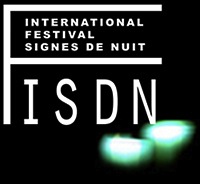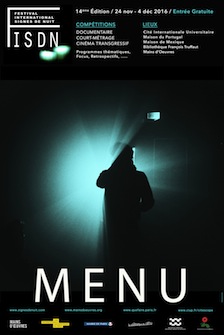 |
|
 |
Le 14e Festival International
Signes de Nuit
Paris
24 Novembre - 4 Décembre, 2016
|
|
 |
 |
 |
|
|
|
|
|
|
|
|
****** |
Focus Asie # 1 |
Jeudi 1, Décembre, 2016 / 14 h
Bibliothèque
François Truffaut
Paris |
Bontok, Rapeless
|
Walang Rape sa Bontok |
 |
Mark Lester Menor Valle
Philippines 2014 / 1:59:00
Two Filipinas, both victims of sexual abuse in varying degrees, yearn
and search for a utopia where women can live without being sexually
violated. By chance, they encounter a study by renowned anthropologist
June Prill-Brett, Ph.D., which states that the Bontok of the
Philippine Cordilleras has lived for eras without a term, nor concept,
nor incidence, of rape. At last, a utopia, where the most heinous of
gender crimes is unheard of. Or, is it?
The search centers on the municipality of Bontoc, the locus of Bontok
culture. Alas, the move to completely revalidate Dr. Brett’s statement
is a generation too late. Oral tradition is now seldom retold, and the
last generation of Bontok Igorots who have lived in the traditional
ato and olog are already in their twilight years.
Through judiciary archives, local government records, and the oral
narratives of Bontok elders, the mission does find its holy grail,
albeit almost dead: suffocating under the inevitable weight of alien
culture and mass media. If at all, the rape-less society still exists,
but only within small, close-knit Bontok communes. Still exists, but
trapped in the rapidly-fading past: the last evidence proving its very
existence is the collective memory of Bontok elders who do not even
know each other, all saying “Idi, awan! Tatta, addan …” (“In our days,
there was none! But today, there is rape…”)
The documentary seeks to answer this question: in a country where the
universality of sexual violence is widely condoned, how did a
rape-less society ever become possible?
|
|
|
+ d'infos  |
|
24 Novembre - 4 Décembre 2016
Le FISDN présente des films classés par sections provenant de pays et de régions différents. Cette section à pour but de faire découvrir et d’explorer différents espaces et cultures avec pour objectif de comprendre les circonstances régionales, politiques et sociales, de reconstruire les spécificités émotionnelles et intellectuelles d’une région ou d’un pays en particulier. Dans ce travail critique, nous pensons que c’est essentiel de choisir des films qui remettent en question par leurs formes et leurs expressions les stéréotypes habituels qui reconstituent une réalité ou un mode de vie. Ce refus est un acte de résistance contre la période actuelle de “globalisation“, qui pousse à penser un model de domination des cultures mais aussi des habitudes.
|
 |
|
|